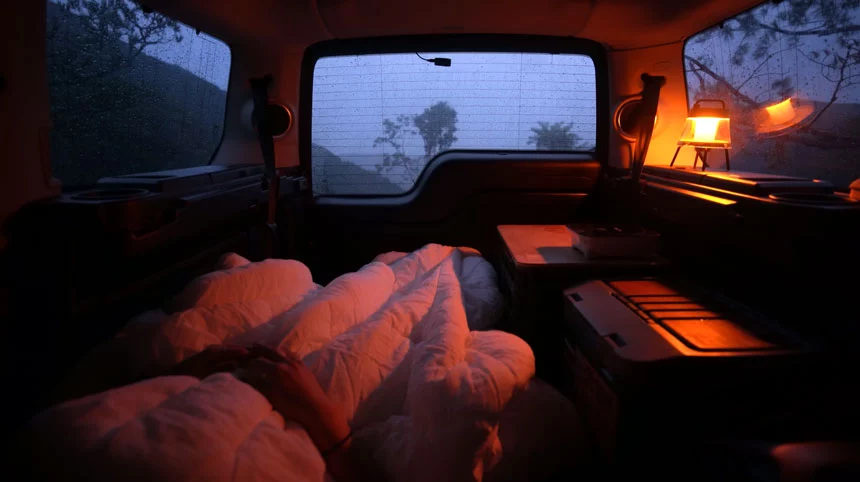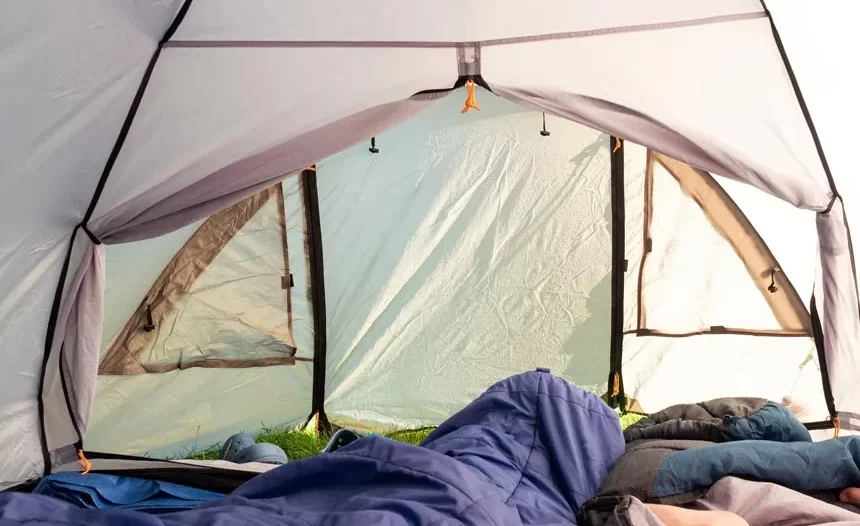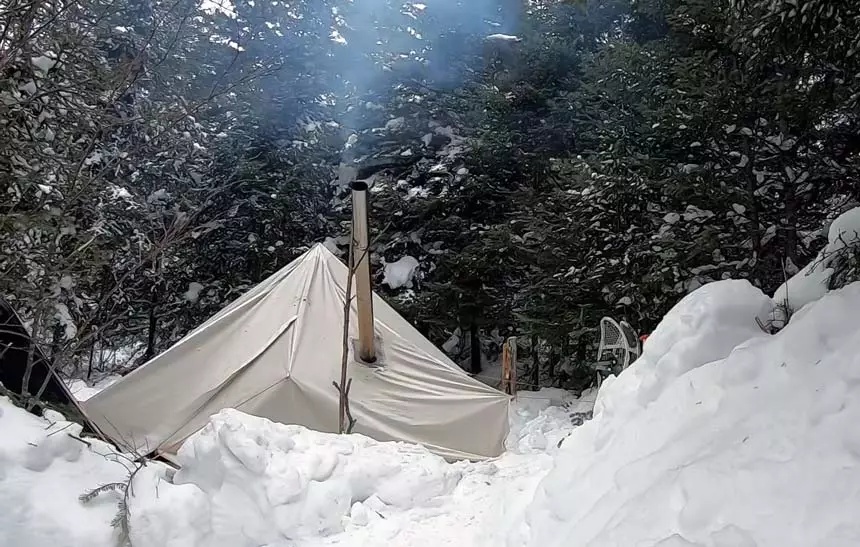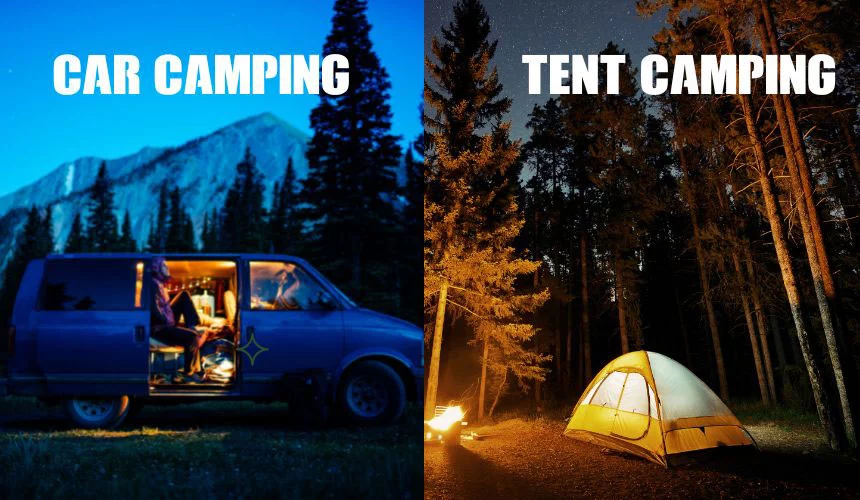We all love the outdoors. There’s something about being one with nature that can’t be beaten. Whether you’re an experienced camper or just getting started, there are a few things you need to consider before heading out on your next camping trip. You’ll make one of the most important decisions between car camping and tent camping.
We are very familiar with tent camping. It’s the traditional method of camping where you pitch a tent at your campsite. But car camping is a bit different. With car camping, you can camp right next to your vehicle. This means you have easy access to your gear and supplies, and it’s getting more popular as people hit the road for their camping trips.
Each option has pros and cons, so it’s crucial to weigh your options before deciding. Keep reading to learn more about car camping vs. tent camping so you can decide which one is best for you.
Table of Contents
What Is Car Camping?
Car camping is a type of camping where you sleep in your car instead of in a tent. It’s a popular option for those who want to camp but don’t want to deal with the hassle of setting up a tent. Car camping is also a good option for those who want to camp in remote areas without campsites or for those who want to save money on campsite fees.
There are two main types of car camping: sleeping in your car and sleeping in an SUV or van. Sleeping in your car is the most basic form of car camping. You park your car at a campsite and sleep in the back seat or trunk. It is a good option for those on a budget or who don’t have much gear.
Sleeping in an SUV or van is a more comfortable option. You can set up a bed in the back of your vehicle and have more space to store your gear. It is a good option for those who want to camp in comfort or have a lot of gear.

Pros of Car Camping
Let’s look at some of the benefits:
1. You Can Sleep in Comfort
Comforters, pillows, and air mattresses are all allowed in a car. This means you can sleep comfortably and wake up refreshed for your day exploring. Also, if camping in a hot area, you can sleep in your car with the air conditioning on to stay cool.
2. You Have Protection from the Elements
When you’re car camping, you benefit from being protected from the elements. If it rains, you won’t get wet. And if it’s cold, you can crank up the heat. You also don’t have to worry about bugs or dirt while car camping.
3. You Can Bring More Gear
Since you have more space in your car, you can bring more gear. This is great for those who want to carry bikes, kayaks, or other large items. You can also get more food and drinks, which is excellent for those who like to camp with a group. However, it works only if you are camping in an SUV, RV, or large car.
4. You Can Stay Connected
If you’re car camping, you can still stay connected to the outside world. Most cars have a 12-volt outlet, which means you can bring a laptop or tablet and stay connected to Wi-Fi. You can also bring a portable charger to keep your phone charged.
5. Easy to Get to the Campsite
You don’t have to hike for miles with all your gear. You can drive to the campsite and set up camp. This is great for those who don’t want to hike or have a lot of gear.
Cons of Car Camping
Now let’s look at some of the drawbacks:
1. You Might Get Stranded
Breaking down in the middle of nowhere can be a nightmare. If you’re car camping in a remote area, you might not be able to get help if your car breaks down. This is why having a good spare tire and knowing how to change it is important. You should also bring a flashlight, a first-aid kit, and extra food and water.
2. You Might Get towed
If you don’t have a campsite reserved, you might get towed. Depending on where you’re camping, there might be regulations about where you can park your car overnight. Check the rules before you camp so you don’t get towed.
3. Cleaning Is Tough
Since you’re sleeping in your car, it can be tough to keep things clean. Dirt and dust will get on your clothes and gear, and the car might start to smell. This is why it’s essential to bring a broom and a dustpan so you can clean up before you leave. Also, not having spatial planning can make things cluttered.
4. Less Living Space than Tent Camping
When you’re car camping, you have less living space than when you’re tent camping. It can be tricky if you’re camping with a group or have a lot of gear. You might feel cramped in your car, and finding a place to put all your equipment can be challenging.
What is tent camping?
Tent camping is the traditional method of camping. It involves pitching a tent at your campsite and sleeping in it for the duration of your trip. Tent camping is an excellent option for those who want to get away from it all and experience nature in its purest form. It’s also a good option for those who don’t have a lot of experience with camping.
Usually, all you need to get started is a tent, sleeping bag, and some basic camping supplies. Also, since tents are relatively small, they’re easy to transport and set up. It can be done in various locations, including national parks, state parks, and private campgrounds, mostly anywhere.

Pros of Tent Camping
There are several pros/advantages to tent camping:
1. You Can Camp Anywhere
Tent camping is one of the best things about summer because you’re not limited to designated campsites. You can set up your tent anywhere, making planning your trip easier and more fun. All you need is a spot that’s big enough to fit your tent and has relatively level ground.
2. You Can Save Money
Tent camping is an excellent option for those on a budget because it doesn’t require a lot of gear or equipment. You can usually get everything you need for a fraction of the cost of car camping or RVing. Also, since you’re not limited to designated campsites, you can save even more money by camping in free or less expensive locations.
3. More Privacy Option
When you’re tent camping, you can set up your tent away from other campers. This gives you more privacy and allows you to enjoy the peace of nature without being disturbed by your neighbors. Even camping on a crowded campsite, you can still have a private and enjoyable experience by pitching your tent away from the rest of the campers.
4. More Living Space Than Others
Tent camping also gives you more living space than car camping or RVing. Most tents are large enough to stand up in and have plenty of room for all your gear; even 6-8 people can camp easily. You won’t have to spend your trip cramped in a small space. You can also bring extra gear, such as chairs, tables, and coolers, without worrying about where to put them.
5. Easy to Clean Up
Tent camping is easy to clean up after your trip. You can simply take down your tent and pack everything without worrying about cleaning up a campsite or hooking up a trailer. Tent camping will be an excellent option if you don’t want to deal with the hassle of cleaning post-trip.
6. Cheaper Option
Budget tents are available for as low as $50, while high-end tents can cost upwards of $500. The average price for a decent-quality tent is around $200. The sleeping bag is another critical piece of gear, and it can range in price from $30 to $200. So, the cost of tent camping can vary depending on your budget and the quality of gear you want.
This makes tent camping an excellent option for those on a budget. You can also save money by buying used or borrowing gear from friends or family. On average, 250$, you can wrap up the cost for a family of four for a weekend trip, which is not too bad.
Cons of Tent Camping
Tent camping does have a few disadvantages, such as:
1. The Weather Can Be Unpredictable
Bad weather is one of the most significant drawbacks of tent camping. If it rains, you’re going to get wet. And if it’s cold, you’re going to be cold. There’s not much you can do to protect yourself from the elements when camping in a tent. This is why it’s crucial to be prepared for all types of weather when planning a camping trip.
2. You Might Get Bugged
Another disadvantage of tent camping is that it attracts bugs. You’ll get bitten if you’re camping in an area with mosquitoes. And if you’re camping in a place where ticks abound, you could be infested with one of these repulsive pests. Bugs may be a significant annoyance when attempting to relax and enjoy the great outdoors.
3. You Might Get Dirty
Tent camping can be a bit on the dirty side. You will get dirty if you’re camping in an area with lots of dust or pollen. And if it rains, you’re going to get muddy. This is just another downside of being exposed to the elements.
4. Condensation Is an Issue
Condensation is another issue to consider if you’re tent camping. When heated air contacts the cold walls of your shelter, moisture can form on the inside of your tent. This might cause your sleeping bag and other clothing to get damp, which may be uncomfortable and even hazardous during winter.
5 Things to Consider for Tent & Car Camping
Here are 5 things you should consider before going car or tent camping:
1. Location
You first need to consider where you’re going to camp. There are a lot of great campsites all over the world, so take some time to research your options. Once you’ve found a few potential campsites, you can start to narrow down your choices.
2. Cost
The cost of a campsite can vary depending on the location and amenities. Some campsites are free, while others can cost hundreds of dollars per night. Be sure to consider the cost of the campsite when making your decision.
3. Climate
The climate of the campsite can also play a role in your decision. If you’re camping in a hot area, you might want to choose a car camp over a tent camp. And if you’re camping in a cold area, you might want to choose a tent camp over a car camp.
4. Activities
The activities you want to do while camping should also be considered. If you’re looking to hike, bike, or kayak, you might want to choose a campsite that’s located near trails or waterways. And if you’re looking to relax, you might want to choose a campsite with a swimming pool or beach.
5. Amenities
The amenities offered at a campsite can also be a deciding factor. Some campsites have showers, laundry facilities, and restaurants. Others might only have a bathroom and a picnic table. Be sure to consider the amenities you want before choosing a campsite.
How to Deal with Difficult Weather Conditions for Camping?

Assuming that you will be doing some form of camping where you will be outside for an extended period, you need to be aware of the potential weather conditions. Here are a few tips on how to deal with challenging weather conditions:
1. Dress in layers
Dressing in layers is an excellent way to adjust to sudden weather changes. Different clothing options can add or remove items depending on the temperature, ensuring your comfort at all times.
2. Be Prepared for Rain
If there is a chance of rain, make sure you have a plan. This could include bringing a tarp or setting up your tent in a location that will offer some protection from the rain.
3. Bring Extra Food and Water
It’s always a good idea to bring extra food and water while camping. If the weather worsens, you will have enough to last until conditions improve.
4. Stay Informed
Make sure you stay up-to-date on the latest weather forecast. This way, you can be prepared for any changes in the forecast.
What Do You Need to Bring with You on Car & Tent Camping Trip?
Things you’ll need for camping:
- Tent.
- Sleeping bags.
- Pillows.
- Camping chairs.
- Cooler.
- Food and drinks.
- Lantern.
- Bug spray.
- Sunscreen.
- First Aid kit.
- Hiking shoes.
What are the Different Types of Tents for Camping?
Pop-up tents: These tents are easy to set up and take down, making them a good option for beginners. They typically have only one or two poles and are made from lightweight materials.
Dome tents: These are a good option for families or groups because they typically have more space than other tents. They have several poles that create a dome shape, which makes them sturdy in windy conditions.
Tunnel tents: Tunnel tents are similar to dome tents but have rectangular shapes. They’re a good option for larger groups because they typically have more space than other types of tents.
Final Wrap Up
Car camping vs. tent camping is a tough decision. Both options have advantages and disadvantages, so consider your requirements before making a final choice. Car camping might be the best option if you want a more comfortable camping experience. But tent camping might be the way to go if you’re looking for a more adventurous experience.
Ultimately, the best option is the one that will allow you to have the most fun and create lasting memories. Leaving this decision to the last minute will only result in frustration, so make sure you plan.



